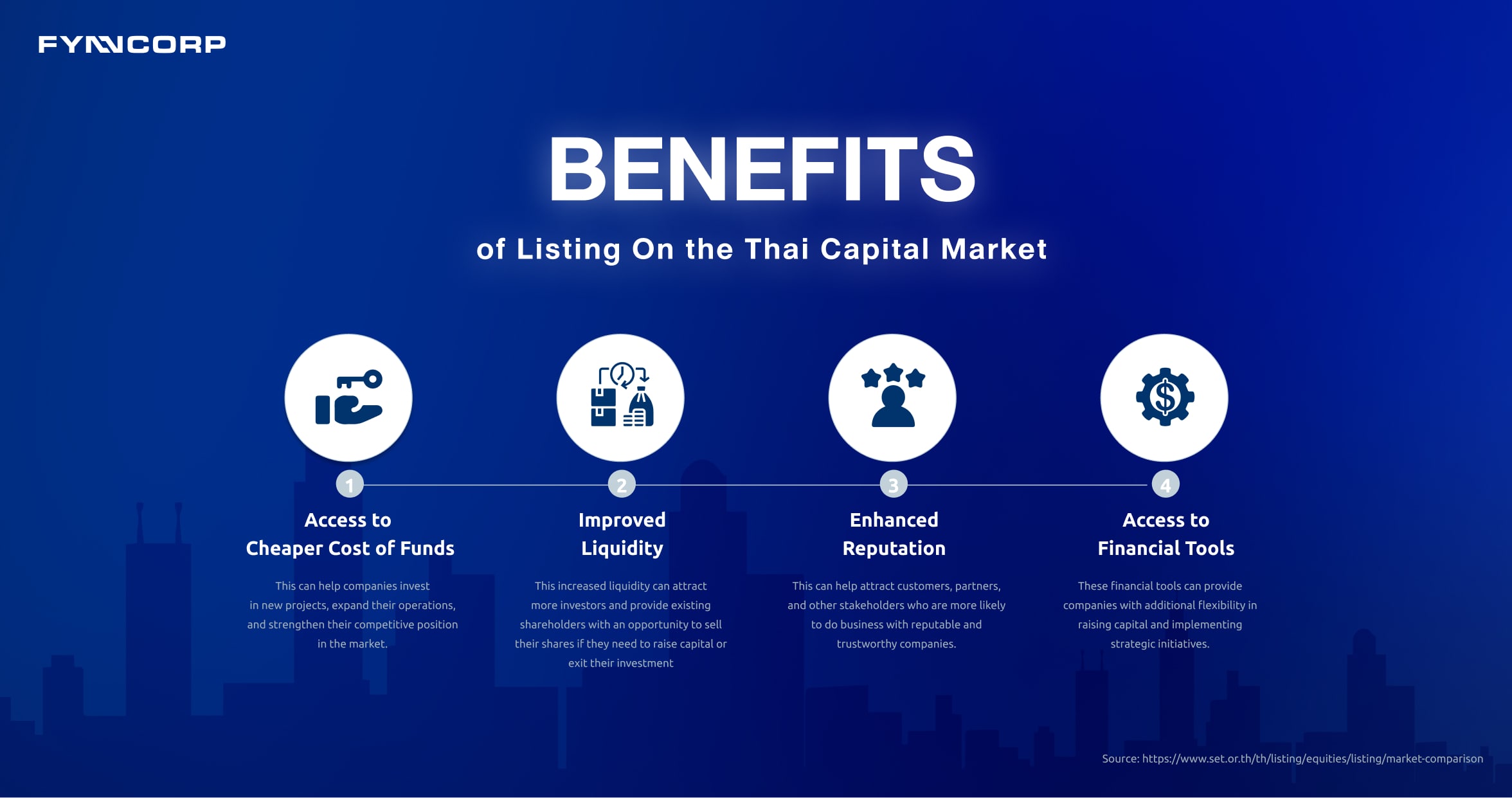
General knowledge
Benefits of Listing on the Stock Exchange
1 MIN READ
Listing a company on the stock exchange is a significant milestone for many businesses. In Thailand, there are three main stock exchanges to consider: the Stock Exchange of Thailand (SET), the Market for Alternative Investment (MAI), and the Live Exchange (LIVEx). Each exchange has its own specific listing criteria. The SET, however, has the most stringent requirements.
To list on the SET, a company must have a paid-up capital of at least 300 million baht, a net profit of at least 50 million baht over the past three years, and a net profit of at least 30 million baht in the most recent year. For the MAI, the requirements are a paid-up capital of at least 50 million baht and a net profit of more than 10 million baht in the most recent year. Lastly, the LIVEx does not have a minimum paid-up capital requirement or a net profit requirement, but companies must be registered as SMEs (according to the guidelines of the Small and Medium Enterprise Development Bank of Thailand) or be startups with funding from the private sector.
Why should companies consider listing on the stock exchange? The benefits include:
1. A source of long-term funding:
By listing on the stock exchange, companies can raise capital from the public to fund operations or expand their businesses. This gives them a competitive advantage, provides a solid financial structure, and opens up opportunities for future fundraising through other securities such as bonds or convertible bonds.
2. Enhanced liquidity:
Listing on the stock exchange increases liquidity as the company’s shares can be easily traded. This increased liquidity attracts more investors and allows shareholders to buy, sell, or convert their shares into cash easily. It also helps determine the fair value of the shares based on market demand and can be used as collateral for loans.
3. Enhanced reputation and credibility:
Listing on the stock exchange boosts a company’s reputation and credibility. Being listed on the exchange signifies a well-performing, stable company with transparent disclosure practices. This can attract customers, partners, and other stakeholders, and increase public recognition.
4. Access to a diverse range of funding and financial instruments:
Listed companies can access a variety of financial instruments such as convertible bonds, warrants, and dividend-paying shares, which can fuel growth and expansion. These financial instruments provide companies with greater flexibility in fundraising and executing strategic initiatives.
Additionally, listing on the stock exchange allows companies to reach a broader investor base and increase liquidity, making their shares more visible and attractive to new investors.
While the process of listing on the stock exchange can be complex, the benefits are significant. At FynnCorp Advisory, we offer comprehensive financial advisory services to guide companies through the IPO process. Our team of experts can provide tailored advice and support to help your company achieve its listing goals.
Enter your email to receive news updates from us
Related Articles
-
Real Estate Investment Trusts (REITs): A New Investment Option
Real Estate Investment Trusts (REITs) are financial instruments that allow real estate companies or property owners to raise capital by pooling funds from various investors. These funds are then invested in income-generating real estate properties. REITs offer a structured and regulated way to invest in real estate, providing a more liquid and accessible investment option compared to direct property ownership.
-
Warrants: A Deeper Dive
What is a Warrant? A warrant is a financial instrument that gives the holder the right, but not the obligation, to buy a specified number of shares of an underlying asset at a predetermined price (exercise price) and within a specified time frame. The underlying asset is typically the common stock of the company issuing the warrant.
-
Tender Offer: A Comprehensive Guide
A tender offer is a public offer made by one company to the shareholders of another, aiming to acquire a controlling interest in that company. This is usually done by purchasing a significant portion of the target company’s shares. The offering company will specify the number of shares it wants to buy, the price it’s willing to pay, and a deadline for shareholders to accept the offer.
-
Level Up Your Skills with FynnCorp: 10 Essential Soft Skills for 2024
For decades, industries have prioritized technical skills, or “hard skills,” that are specific to a particular job or career. However, the job market is evolving, and soft skills are now in high demand. These are transferable abilities that are valuable across various professions.











